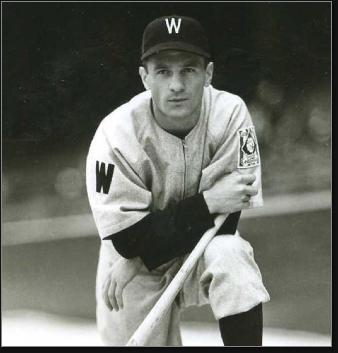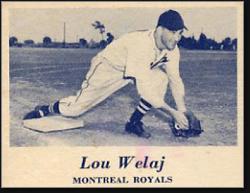
Sport: Baseball
Born: May 27, 1914
Died: September 13, 2003
Town: Manville, New Jersey
ownship, PA and grew up in Manville, NJ. Johnny was the first of five children born to Catherine and John Welaj (pronounced WEE-lay), who moved east during his boyhood, first to Philadelphia and then to Somerset County, where his dad went to work for Johns Manville. Johnny was a talented all-around athlete for Bound Brook High School, where he was typically the fastest kid in whatever game he was playing.
After graduating at age 19, he played semipro ball and was discovered and signed by Joe Cambria in 1936. Cambria was a baseball entrepreneur who owned several minor-league clubs during the Depression and had a working relationship with the Washington Senators. Johnny played close to home for Cambria’s Trenton Senators for three seasons. His teammates included fellow New Jerseyans George Case and Alex Sabo, one of Fordham’s legendary “Blocks of Granite.” In his off-seasons, Johnny took a number of business and finance courses—which would ultimately enable him to carve out a career in baseball that stretched across six decades.
As a player, Johnny reached the majors in 1939 when the Senators began an aggressive rebuilding program. That July, before a doubleheader at Yankee Stadium, Johnny was honored by hundreds of hometown fans in a “Johnny Welaj Day” ceremony.
It was the first of two events that afternoon. Between games, Lou Gehrig gave his “Luckiest Man on Earth” retirement speech. Later that year, Johnny hit his first big-league homer at Yankee Stadium.
Despite distinguishing himself as one of the most aggressive baserunners in the AL, Johnny had a difficult time cracking the Nats’ everyday lineup. He was a bench player for Washington for three years and then—following trades to the Red Sox, Yankees and Tigers—he landed in Philadelphia, with the A’s. He played in 93 games in 1943 and was one of Connie Mack’s favorite players.

Johnny was drafted into the army after the 1943 campaign and saw action in the Pacific, where he earned two battlefield stars and attained the rank of sergeant. After his discharge in 1946, he joined the Red Sox’ AAA team in Louisville and was one of the International League’s top players from 1946 and 1948—playing for the Montreal Royals in ’48. Leg and knee injuries ruined any chance of returning to the majors, but in 1950 Johnny was reunited on the Royals with his youngest brother, Lou (left), under manager Walt Alston.
Johnny’s last season as a player was 1954. He stayed in baseball as a manager and coach, and then as a front-office fixture with the Senators. When the club moved to Minneapolis in 1961, he stayed in DC to work for the expansion Senators, where he was in charge of sales, promotions and advertising. Johnny accompanied the club to Texas in 1972, where he was the Rangers’ Director of Stadium Operations until his retirement in 1994. He continued to work for the club well into his 80s and passed away in Arlington, TX at the age of 89.